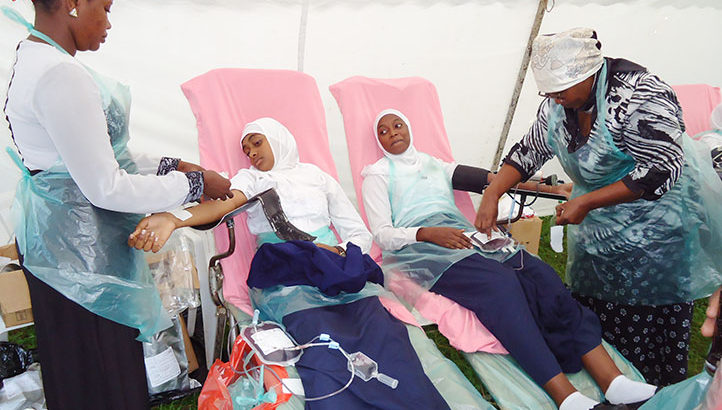África/Uganda/Abril 2016/Fuente:TheObserver /Autor:Zurah Nakabugo
Resumen: Los médicos afirman que el mayor porcentaje de sangre libre de infecciones se dona de las escuelas, ahora están alentando a más estudiantes a participar. Los estudiantes de la escuela secundaria Kawempe donan sangre y los funcionarios del banco de sangre Nakasero espera obtener alrededor de 200 unidades de sangre de la escuela.
Since doctors claim the biggest percentage of blood free of infections is donated from schools, they are now encouraging more students to participate.
On April 15, students of Kawempe Muslim Secondary School donated blood and officials from Nakasero blood bank expected to get about 200 units of blood from the school.
«When we come to such big schools, we get bigger units of blood, which can feed Mulago hospital for about two or three days. Mulago uses about 100 units of blood daily yet other hospitals also need blood,» Lillian Nantambi, the blood donor recruiter at the blood bank, said.
She told The Observer they are targeting schools and blood donor clubs since they are low- risk areas of getting blood with infections, unlike communities such as markets, corporations and government institutions.
«We always have scarcity of blood during school holidays, since in other communities people are not willing to donate due to lack of sensitization, and many have infections. So, during school time, we collect as much blood as possible,» she said.
Nantambi also said they carry out blood donation talks with the students before they donate and advise students with diseases such as HIV/Aids, syphilis, gonorrhea, pressure, diabetes, Hepatitis B, malaria, cough, ulcers, asthma and others to avoid donating since it is risky to their lives.
«However some schools refuse students to donate blood, saying they don’t want to interfere with their school programmes. Others don’t see the value of donation, saying that blood is always not available in the hospitals and they always buy it anyway,» she said.
Nantambi said the country is not in scarcity of blood; the demand in hospitals is just too high.
«We have 22 teams of blood collection from different parts of the country and our target is 1,000 units of blood per month. We try and meet our target most times, although blood takes only 35 days to expire. So, this is why we have to look for blood all the time,» she said.
Nantambi encourages students from 17 years and above to donate blood. It is unhealthy for children younger than that.
Quraishy Lukyamuzi, Kawempe Muslim SS patron Red Cross club, said two weeks after donating blood, they advise students to collect their results of other infections tested.
«During blood donation a few years ago, we were able to detect two students who had Hepatitis B. We informed their parents and they were sent home for treatment,» he said.
Lukyamuzi said when they find students with low haemoglobin, they advise them to eat the right, iron-rich foods and those found with excess blood are advised to donate it to avoid diseases such as hypertension and other heart diseases.
Connie Chepkosgei and Anthony Telthem, both S5 students, said they donated blood for the first time this year.
«I feel good when I help by donating blood. After donating blood, we get cards which we can present to hospitals in case we need blood transfusion,» Riyana Mugambe, a S5 student, said.
Nantambi hailed Kawempe Muslim SS staff for always mobilizing and sensitizing students about the importance of donating blood.
Fuente de la noticia: http://www.observer.ug/lifestyle/42-entertainment/43764-blood-donors-target-schools-for-less-infection
Fuente de la imagen: http://www.observer.ug/images/Lutfa-Hassan-Zein-and-Riyana-Mugambe-both-senior-five-students-of-Kawempe-Muslim-Secondary-school-donate-blood.jpg







 Users Today : 95
Users Today : 95 Total Users : 35459561
Total Users : 35459561 Views Today : 152
Views Today : 152 Total views : 3417910
Total views : 3417910